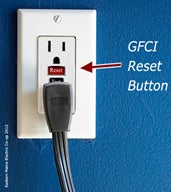When the weather warms up, and life moves outside, it's always a good idea to give additional thought to electrical safety outdoors. The following are some general tips for staying safe electrically in the spring and summer.

- Make sure your outside electrical receptacles are fitted with ground fault current interruptors (GFCIs). Unlike a fuse or a circuit-breaker, which are designed to protect the home's wiring, a GFCI is designed to protect people from electrical shocks. It works by opening the circuit when it detects an imbalance between current flowing from the source and the current flowing back through the ground wire. An imbalance between these currents indicates that some of the incoming current is flowing through something else. You have probably seen GFCIs in newer kitchens. A GFCI receptacle can be recognized by the reset button (see image).
- Inspect power tools and outdoor appliances for frayed or cracked cords or damaged plugs.
- Use only extension cords rated for outdoor use and rated for the level of power your power tools or appliances use.
- Look up before carrying ladders or working near trees. Overhead power lines can deliver a shock through ladders, tree trimming equipment, or trees themselves. Make sure before you raise a ladder or trim overhead trees that you are nowhere near power lines. Even if overhead lines are supposed to be insulated, that insulation can crack or otherwise be compromised.
- Teach children to stay away from electrical transformers and substations.
- Teach them not to climb trees near power lines.
NOTE: For your safety, Eastern Maine Electric will install plastic covers for service wires if a homeowner advises the Co-op that he or she will be working near the wires. To request cover-ups, call the Co-op at (800) 696-7444 during regular working hours and speak to the dispatcher at extension 250.
Electrical Safety, Lightning, and Storms
Electrical safety includes being safe from lightning, so here are some things to remember. The weather is most dangerous when a sudden change in temperature is on the way. High winds and lightning are one way that storm cells release energy as they move through an area.
The safest place to be in a thunderstorm is inside an enclosed building with plumbing and electrical wiring. Even then, lightning can still pose a rare threat while you are inside. To maximize safety in a lightning storm,
- Stay away from windows and doors
- Avoid contact with electrical equipment, particularly if it is connected to antennas, outside cabling, or satellite dishes.
- Avoid contact with water and plumbing, including sinks, baths, and faucets.
When a lightning storm catches you outside, and there is no time to go to a safe building, you want to make the lowest, smallest, and least conductive target possible for the lightning.
- Move to a low point. Lightning hits the tallest available object, so get down low in a crouched position if you are in an exposed area.
- Stay away from trees.
- Avoid metal. Don’t hold onto metal items like bats, golf clubs, fishing rods, tennis rackets, or tools. Stay away from metal sheds, clotheslines, poles, and fences.
- Stay away from water, including pools, lakes, puddles, and anything damp like grass.
- Don’t stand close to other people. Spread out.
- Don’t lie down on the ground, even though that will lower your profile, because laying spread out makes you a bigger target.
- Lightning doesn’t always give you warning, but if you feel your skin tingling and your hair stands on end, lightning may be about to strike. Crouch down, tuck your head, and cover your ears.
Conventional wisdom has long said that it is dangerous to use a land line phone during a lightning storm. According to the fact-checking site snopes.com, this is not an urban legend. One or two people a year are struck by lightning while talking on the phone. Use corded telephones only for emergencies. Cordless and cellular phones are safer.
Assume that every power line is a live power line, even if there is no sparking, noise, or other sign of voltage.
- Stay away from the line and from anything touching it. With the right soil conditions and level of moisture, people can be shocked at a considerable distance through a downed line.
- Do not attempt to move a downed power line or anything in contact with the line, even using another object such as a broom or stick.
- Water is a good conductor of electricity. Any amount of water, even a puddle, could become energized. Be careful not to touch water or anything in contact with the water near a downed power line.
Sources: The Electrical Safety Foundation International, the National Lightning Safety Institute, the National Weather Service, the New York Department of Health, the Midwest Severe Storm Tracking Response Center, NRECA, and snopes.com.

